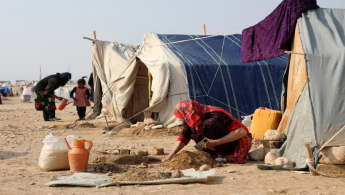Pakistan warns of 'grave consequences' from Afghan economic meltdown
Pakistan warned Sunday of "grave consequences" for the international community if Afghanistan's economic meltdown continued, urging world leaders to find ways to engage with the country's Taliban leaders to help prevent a humanitarian catastrophe.
Speaking at the opening of a special meeting of the 57-member Organisation of Islamic Cooperation (OIC) in Islamabad, Pakistan foreign minister Shah Mahmood Qureshi said fallout from the deepening crisis could mean mass hunger, a flood of refugees and a rise in extremism.
"We cannot ignore the danger of complete economic meltdown," he told the gathering, which also included Taliban foreign minister Amir Khan Muttaqi alongside delegates from the United States, China, Russia, the European Union and UN.
The meeting is the biggest major conference on Afghanistan since the US-backed government fell in August and the Taliban returned to power.
Since then, billions of dollars in aid and assets have been frozen by the international community, and the nation of 38 million now faces a bitter winter.
The United Nations has repeatedly warned that Afghanistan is on the brink of the world's worst humanitarian emergency with a combined food, fuel and cash crisis.
Qureshi said the OIC was being asked to consider a six-point plan to help Afghanistan that would engage with Taliban authorities to help ease pressure on their country.
It would include coordinating aid, increasing investment, helping rebuild Afghan institutions and providing technical experts to manage the economy.
Any aid pledges were set to be announced Sunday evening.
No nations have yet formally recognised the Taliban government and diplomats face the delicate task of channelling aid to the stricken Afghan economy without also propping up the hardline Islamists.
Nearly all the opening speakers made mention of the Taliban's need to protect the rights of minorities and allow women and girls the right to work and be educated.
Although the Taliban have promised a lighter version of the hardline rule that characterised their first stint in power from 1996 to 2001, women are largely excluded from government employment and secondary schools for girls have mostly remained shuttered.
The OIC meeting was not expected to give the new Taliban government the formal international recognition it desperately craves.
Earlier, Qureshi said there was a difference between "recognition and engagement" with the new order in Kabul.
"Let us nudge them through persuasion, through incentives, to move in the right direction," he told reporters ahead of the meeting.
"A policy of coercion and intimidation did not work. If it had worked, we wouldn't have been in this situation."
Pakistan, Saudi Arabia and the United Arab Emirates were the only three countries to recognise the previous Taliban government.
The meeting is being held under tight security, with Islamabad on lockdown, ring-fenced with barbed wire barriers and shipping-container roadblocks where police and soldiers stood guard.





 Follow the Middle East's top stories in English at The New Arab on Google News
Follow the Middle East's top stories in English at The New Arab on Google News


